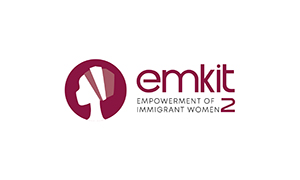
EMKIT2: An Empowerment Toolkit for Trainers for the Development of the Social and Cultural Competence and Media Literacy for Low Skilled Migrant Women
| Διάρκεια: | 01.09.2018/ 31.08.2021 (36 months) |
| Εταίροι: |
|
| Ιστοσελίδα έργου: | http://emkit2.projectsgallery.eu |
| Αναθέτουσα Αρχή: | European Commission |
| Πρόγραμμα: |

Περιγραφή
EMIKT2 aims to:
- Develop 3 Qualification Frameworks for the Social & Civic (S), Cultural Awareness & Expression(C) and Media Competence(M) (SCM competences) tailored for the specific target group in a specific context (see innovation elements)
- Based on the Learning Outcomes of the QFs developed enrich activities offered at each stage by designing 42 new workshops for the development of the SCM competences. The activities developed in EMKIT did not tackle the social and cultural capacity of the migrant women which is vital for the succession from one stage to the next on the AC ladder. Also, EMKIT did not deal with the media literacy, a skill that is becoming increasingly important as a result of digital media expanding into the realm of human communication. The ability to use media well is crucial to a person’s participation in the society and active citizenship.
- Develop 42 digital tools for the newly developed workshops for trainers for the development of the SCM competences and incorporate then in the existing EMKIT online tool.
- Introduce & develop a digital assessment tool and incorporate it on the existing EMKIT toolkit. EMKIT was developed for women who live in isolation and need to progress through all stages to reach active citizenship. Through the use the EMKIT (for 6 years now) it has been evident that a) a systematized method is needed for an impartial assessment of the stage a woman is in and to avoid unnecessary activities that are tailored for women who are at a lower stage of the scale b) validate the results of the empowerment process. Therefore, this project suggests the development of an assessment tool in order to identify the stage of the woman and validate the Learning Outcomes of the activities implemented at each stage.

